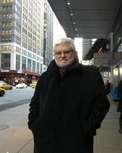 Chris
McDonnell, UK
Chris
McDonnell, UK
chris@mcdonnell83.freeserve.co.uk
Previous articles by Chris Comments
welcome here
March
8, 2017 We
each have a name

"I
recognise you, I am sure we have met but for the life of me I cannot
remember your name."
How
many times that has happened to all of us, and with age the frequency is
even greater.
The
identity that comes with our name is important. It is something we have
grown up with, a familiar sound and an accustomed letter shape. Often in a
room if someone else is referred to by the name we share, we also pause an
instant and react 'is it me they are talking to?'
In
school, I found a quick and useful way of talking with a pupil whose name
I had forgotten. A girl got called ‘Agatha’ and a boy 'George'. In
annoyance they quickly gave me their real name and all was fine. I tried
it one last time, just a few days before retirement, when I met with a
very young boy just outside my room. "Hello George, how are
you?" to which he replied without hesitation "My name
ain’t George, silly!" and walked off, leaving me ruefully
smiling at his common sense.
The
prophet Isaiah gave us the memorable words "O
Israel
,
Fear not: for I have redeemed you, I have called you by your name; you are
mine."
Totalitarian
states reduce the identity of political prisoners by giving numbers, no
longer referring to them by their personal names but by an abstract
sequence of digits. Taking away a name reduces in some fundamental manner
our identity.
At
our Baptism, we are given our name, the gift of our parents. Very often
one of the names we give to a young child is a family name that has come
down through the generations. One of my friends is called 'Helen'. So is
her daughter, granddaughter and great granddaughter! It gets interesting
when they are all together.
The
identity of name was associated with entry to a religious order, when the
monk or nun, sister or brother received a new name, a sign of leaving
behind their previous self as they embarked on a newly dedicated journey.
That practice has largely ceased since the Council and many religious have
reverted to using their Baptismal names. The identity of the Bishop of
Rome is marked by the name he takes when elected by the Conclave.
Archbishop Jorge Bergoglio took the name of Francis, a name he has
continually represented to the world by his words and deeds.
In
towns and villages across this country are placed War Memorials, a Cross
or stone plaque inscribed with names of local men and women who lost their
lives in conflict. It is a simple list that marks who they were, a
reminder of their years in our midst.
At the National Arboretum in Staffordshire, many thousands of names
cover the stone walls of the National War memorial, list upon list upon
list, a silent reminder from the 20th Century years.
Names
and titles have been used over many years to denote status and power. The
insistence on the correct title enforced control. 'Treat me with the
respect I deserve'. Often of course their actions and way of life did
not deserve respect so they hid behind their title.
Arriving
as the Headteacher of a new school after local reorganisation, I was asked
by a member of staff "What do we call you?" My
answer was simple. "I have a first name, so do you. That’s what
we call each other". And that is what we did till the day I
retired. What they called me when I wasn't there, I never knew. But that
was no problem. Our relationships rubbed along over the years, using the
informality of names that identified us from our childhood.
In
the Book of Exodus we read of Moses wondering what to tell the people
regarding the identity of God.
Then
Moses said to God, "If I come to the people of
Israel
and say to them, 'The God of your fathers has sent me to you,' and they
ask me, 'What is his name?' what shall I say to them?" God said to
Moses, “I AM WHO I AM.” And he said, “Say this to the people of
Israel
,
‘I AM has sent me to you.’” God also said to Moses, “Say this to
the people of Israel, ‘The Lord, the God of your fathers, the God of
Abraham, the God of Isaac, and the God of Jacob, has sent me to you.’
This is my name forever, and thus I am to be remembered throughout all
generations.
Who
we are, our identity, our name, we carry from birth through life till the
time of our death. We are known and remembered. ’I have called you by
your name, you are mine’
END
----------------------------------------
 Chris
McDonnell, UK
Chris
McDonnell, UK Chris
McDonnell, UK
Chris
McDonnell, UK